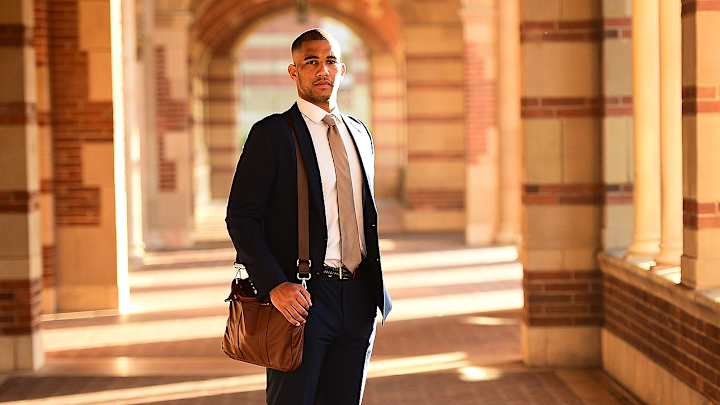Cody McDavis Fighting to See Change in the NCAA Sexual Assault Policy

This story appears in the March 11, 2019, issue of Sports Illustrated. For more great storytelling and in-depth analysis, subscribe to the magazine—and get up to 94% off the cover price. Click here for more.
As a basketball player at Northern Colorado eyeing a future law career, Cody McDavis was familiar with the NCAA’s labyrinthine rule book, which includes limits on the size of mail envelopes for letters to high schoolers and restrictions on student-athlete hosts buying keepsakes for visiting recruits. As a sexual assault prevention advocate who grew tired of seeing such scandals plague athletic departments across the country, what he could not believe was that there were no bylaws linking an athlete’s eligibility to a history of sexual and gender-based violence. Beyond the ethical breaches and risk of public backlash, playing an athlete who had been found guilty of sexual assault would not break any NCAA rules. This, McDavis decided, needed to change.
If signatures on an online petition are to be believed, more than 214,000 people agree with him. McDavis, now a 25-year-old third-year law student at UCLA and a managing editor of the school’s law review, launched the campaign in October with support from Brenda Tracy, the prominent activist and rape survivor who runs the nonprofit Set the Expectation. The petition calls on the Power Five conferences (the ACC, Big 12, Big Ten, Pac-12 and SEC) to create and adopt rules banning athletes with histories of violence—positive findings from schools or judicial bodies—from competing for its member schools.
McDavis hopes this would force athletic departments into a proactive approach while evaluating recruits or transfers. Where they might stand idly while another university department handles the matter—be it an active complaint or a past transgression—or claim ignorance without consequences, the petition’s proposal would make such inaction unacceptable. As with athletes who receive impermissible financial benefits or fail to meet academic standards, schools would risk committing infractions stemming from using ineligible players, which can carry penalties such as vacating championships and forfeiture of revenue. “So the athletic department has a very clear mandate,” McDavis says. “It must have athletes who are free and clear of these issues.”
This is not McDavis and Tracy’s first push for such a change. The two met while serving on the NCAA’s Commission to Combat Campus Sexual Violence from 2016–18. The commission’s proposal was to incorporate conduct as a criterion for eligibility, the way that grades and amateurism are. Last August, the NCAA said it would continue to monitor such issues with such a recommendation in mind but did not move to take more action. The NCAA disbanded the commission last August, saying its mission had been completed.
Its members were frustrated. “It seemed like, yeah, we have an opportunity to do good work here, but when push comes to shove, nothing’s really changing,” McDavis says. In October, he and Tracy devised an alternative: to advocate for such legislation at the conference level, where there might be less bureaucracy. The resulting petition focuses on the Power Five in hopes those leagues will inspire the rest of the collegiate athletic landscape to follow suit.
So far the message is catching on. In addition to the trove of online cosigners, a group of nine senators, led by Ron Wyden of Oregon, recently sent a letter to the Power Five commissioners calling for their leagues to address issues of sexual violence and explore policies preventing athletes with violent pasts from playing for their member schools. McDavis’s goal is to get a congressional backer in each of the 35 states with a Power Five school.
One benefit of the conference-level initiative is that it allows for flexible navigation of varying local statutes, which was one reason cited by the NCAA for its declining to pursue nationwide requirements. Defining disqualifying behavior can be tricky when laws differ from state to state. “I’m not asking for any conference to define misconduct in a certain way,” McDavis says. “I’m just asking that they do it and that it’s meaningful.”
There is one conference McDavis can already point to as a model. Last summer the Big Sky—the league in which McDavis played basketball—instituted its Serious Misconduct Rule, based on a recommendation by the conference’s student-athlete advisory body. The rule bans athletes who have been found to have committed a range of violations including any act of sexual violence, domestic violence, stalking or use of a deadly weapon, either by the judicial system or a university disciplinary body. But it also allows schools some degree of autonomy, with regards to local laws (what may be considered a felony in one state is a misdemeanor in another, for example), and institutes a waiver system for appeals and potential exemptions. The plan is for it to be fully implemented by this fall. “This is the right thing to do,” Big Sky associate commissioner Jaynee Nadolski says, “and we should lead and let people know this is doable.”
The larger goal, McDavis says, reaches beyond a rule book. “Changing the rules,” he says, “are a means of changing the culture.” He has found sympathetic minds far and wide online. Next comes finding them among those in the corridors of power.
